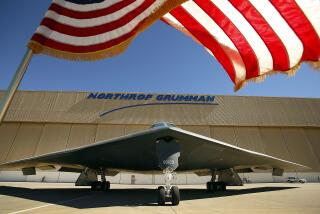Hughes Plans to Merge Units, Reduce Staff : * Aerospace: Chairman Malcolm Currie says there is a backlog of orders now, but he is worried about 1993 and beyond.
- Share via
Hughes Aircraft Chairman Malcolm Currie said Friday that the company is planning a consolidation of its business units, reductions in its production capacity and a cutback in staff.
Currie said in an interview, however, that Hughes will not go through a major shake-up this year or dispose of entire divisions or groups, as has been widely feared by employees and suppliers.
Staff reductions at the aerospace firm, a subsidiary of General Motors, will follow cutbacks of 2,500 in 1991 and more than 9,000 in 1989. Hughes has 64,000 employees, down from a peak of 82,000 in 1986.
“We are looking at a staff reduction, but I can’t comment on the extent of it,” Currie said. “We are in the middle of studying it right now.”
Currie described the changes as a continuation of last year’s efforts to align the company for a greater emphasis on commercial business, rather than defense.
Although the defense budget is dropping quickly, Currie said, Hughes is starting 1992 with a “very strong backlog of business.” But the future is less assured.
“What I am really nervous about--and what the whole industry is nervous about--is what happens in a year to two years from now, when a lot of the production contracts around the industry run out,” Currie said. “That’s when industry is really going to feel it.”
In the meantime, Hughes is working to eliminate excess capacity and cut expenses for leased space. For example, the company recently shifted much of its work in airborne radar from El Segundo to Fullerton, allowing its satellite production operation to take over space that was used for radar production, Currie said.
“Along with the rest of the industry, I would not be surprised if we will have to write off some assets,” he said.
Hughes’ tactical missile business has been hard hit by defense reductions, leaving a relatively small business base and substantial excess capacity at the firm’s Tucson missile plant.
In the long term, “it is very worrisome to me,” Currie said. “We will have to either mothball some of it, write some of it off, possibly consolidate with other activities in the industry--I don’t want to speculate on that right now--(or) do something.”
More to Read
Inside the business of entertainment
The Wide Shot brings you news, analysis and insights on everything from streaming wars to production — and what it all means for the future.
You may occasionally receive promotional content from the Los Angeles Times.











